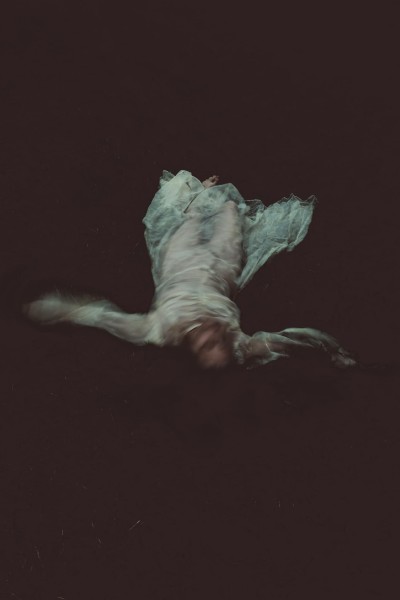Her nose, the triangle of it on her face. Nothing at all like yours. The pores, open, the mouths of a hundred tiny fish at the surface of the pond where you took heels of bread and your brother squealed to be released from the stroller. Notice fingerlings of red veins, trickling across her cheeks, like the bare Japanese maple branches outside your childhood bedroom window. Think about the fleshy lobes of her ears that your seventh grade science teacher once told you would continue to grow throughout your life. Her brows, now white-grey hashtags of winter sky—can’t believe you hadn’t noticed that sooner. Hands. Commit to memory the unusual length of the nail beds, the slender contours of the phalanges. Lift. Hold. Wonder if she knows. It feels like nothing at all but papery smallness. Notice the pale coppery stain trailing from the tube in her mouth, dampening, spreading—now that you look closer—beneath her head. Ask the nurse to change the pillow. Breathe easier. You have done everything you can.
Hear your father say he has never loved her more than at this moment and think what the fuck is that about? But you can feel the truth in what he says crawl under your skin, a nasty little botfly ready to lay an egg you have no intention of hosting. Your brother will say she was a good mom and you will add relatively speaking and wonder where the hell did that come from. You only thought you said it. You didn’t. Hear your sister say it’s okay to go. Think nothing about this is okay.
Ask for one minute alone with her. Think of the regrets piled up, a river of rocks bursting from your chest. Say you are sorry. For what? For everything you did and didn’t do, being angry—a brat, a bitch—for wanting her to be sorry back at you even though you think she was, is. Sorry you threw the chair at her when she found your stash under the bed, sorry you left home without saying goodbye but made sure the door slammed so hard plaster rained. Sorry you called late on her birthday, after she had gone to bed, resigned to not hearing from you, and you had forced her to answer your call in a voice that tried to make you think it was no big deal, but she didn’t say so. Sorry. Sorry you sometimes let her calls go to voicemail, but you had a life, children of your own. Sorry for everything, sorry.
A sloshing bucket of sorry you are suddenly slopping every which way and all over her. Feel no better for having spilled it and then realize she isn’t wearing her hearing aid and never heard a damn word you said anyway.
Think about being sixteen, making yourself throw up so you wouldn’t have to go to work, face the old man who stuck a hand down your pants in the storage closet, smashed you to him, groaned into your neck, told you to be nice to him, a good girl. When you finally wrangled words to explain what had happened they came up tasting like cigar smoke, wintergreen aftershave, the putrid old-people smell of rotting eggs mixed with something once green. Suck it up, she said. Tell the old bastard to leave you alone.
Come together. Say The Lord’s Prayer. Remember how much you hated it, how small it made you feel, how indebted, until you get to the part about forgive us our trespasses as we forgive those who trespass against us, and it will go off like a firecracker in your brain. This is a two-way street. Think—this is what I mean. This is what I am trying to say! Sorry.
You will look at her and not know the difference between alive and dead. It looks the same even after the alarm goes off that tells you that this, this is dead.
Three days later you take a walk. Your dog insisted. The rain has stopped. Walk and try to find the words in your head to talk to her. Articulate these things because they need to be sorted: Your crimes, hers. Atonements made—not. Each having a specific heft and weight. Back to the beginning of time, to when you were four and she slapped you across the face—hard—so the sting of it all can still be felt through three generations. All the other children were driving her crazy, but you were the only one that was hers. You, the only one she could smack.
The dog will stop to pee. You will be standing under a sugar maple broken into a confetti of slick pink-gold-green. Remember now, you had gone back to work, hid in the bathroom stall, door locked, climbed on a toilet seat so he couldn’t see your feet if he came looking. Nothing to suck up. The air gone. You wanted her to be more. You wanted her to breathe air into you. Blow up your lungs, pump your breastplate, which—way back then—was too soft-tender. Breathe into you, pump, repeat. Ask her why she wasn’t more.
Hear her. Not her voice. The words at once, not stretched out with spaces between them, a single splatter at you, in you, through you. I’m sorry, she will say, or is saying, or said, because there is no before or after. Only words in this moment, contained in a single rainwater pearl and spreading across the parchment of your heart. You were so pretty. It was bound to happen. It always does. I tried to make you stronger.
Think about trying not to think about the deathwatch. Be sorry she wasn’t more. Mad at her for being less. Think about just what is more and what is less and we are all more and less, more or less.

Notes from Guest Reader Jay Patel
I love this piece. The tone, the second person, the narration, the recollection of memories. It becomes so complex so quickly, in the best possible ways. And its ability to carry with it this thread of humanity, of who we are to people, who they might be to us, and what we do with that is devastatingly beautiful. That last line will stay with me.


 The core workshop of SmokeLong Fitness is all in writing, so you can take part from anywhere at anytime. We are excited about creating a supportive, consistent and structured environment for flash writers to work on their craft in a community. We are thrilled and proud to say that our workshop participants have won, placed, or been listed in every major flash competition. Community works.
The core workshop of SmokeLong Fitness is all in writing, so you can take part from anywhere at anytime. We are excited about creating a supportive, consistent and structured environment for flash writers to work on their craft in a community. We are thrilled and proud to say that our workshop participants have won, placed, or been listed in every major flash competition. Community works.